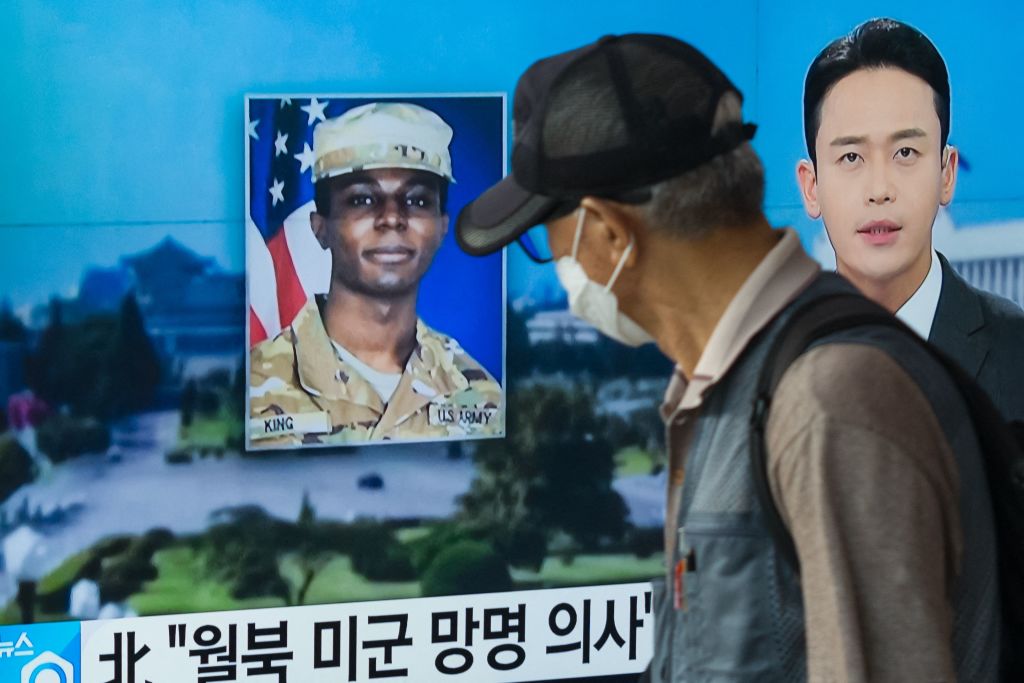Travis King Update: 'Very Happy' After North Korea Expulsion
Travis King ‘Very Happy’ To Be Back In US After Soldier Defected To, Expelled From North Korea

In this photo taken in Seoul on August 16, 2023, a man walks past a television showing a news broadcast featuring a photo of US soldier Travis King (C), who ran across the border into North Korea while part of a tour group visiting the Demilitarized Zone on South Korea’s border on July 18. | Source: ANTHONY WALLACE / Getty
Despite looming legal implications and a reported racial resentment of the American military, a Black Army soldier who defected to North Korea over the summer was pleased to return to the U.S. after his expulsion from the rogue nation, officials said.
Army Private 2nd Class Travis King, 23, was placed in U.S. custody on Wednesday after North Korea moved to deport him following his apparent attempt at seeking refuge there months ago. While it’s unclear why North Korea “expelled” King, NBC News reported that Army officials said King appeared to be healthy and upbeat.
King’s whereabouts were not immediately disclosed, but Department of Defense officials suggested he could be treated at the Brooke Army Medical Center in San Antonio, Texas, for “post-isolation support activities, known as PISA, which are designed to help prisoners of war, hostages and wrongfully detained Americans reacclimatize to being in the U.S. and respond to any trauma or post-traumatic stress.”
On his way back to the U.S., King – who was transferred to China from North Korea before being taken into American custody – was described as being “very happy” that he was returning to the States.
What comes next for King was not clear. He could be disciplined for going AWOL in North Korea. Army officials said that his fate would be announced “at a later time” and that the immediate priority was making sure King was okay.
“The Army’s focus right now is on ensuring the soldier’s well-being and privacy,” said Bryce Dubee, a spokesperson for the U.S. Army.
The last time North Korea expelled a U.S. citizen, American college student Otto Warmbier was released in 2017 in a vegetative state following his imprisonment. He died shortly afterward.
What happened?
King crossed into North Korea on July 18, about a week after he was released from a South Korean prison on assault charges. He was behind bars for 48 days because he did not pay a $4,000 fine for damaging a South Korean police car and “shouting profanities about Koreans and the Korean army” while he was being arrested in October of last year.
Following King’s July 10 release from the prison in Cheonan, which is about 50 miles south of the capital city of Seoul, he was set to return to a military base in Texas where he was expected to be further disciplined for his actions in South Korea.
But after King was escorted to an airport outside of Seoul, he was not allowed to board his flight because he lacked the proper paperwork, prompting him to be removed from the airport.
Eight days later, King found himself embedded within a tour group visiting the Joint Security Area where the Military Demarcation Line (MDL) separating South Korea from North Korea is before he reportedly ran across the MDL while laughing. The Associated Press reported that King “sprinted” and “bolted” across the MDL.
Diplomatic efforts to secure his return began promptly as it took North Korea about a month to confirm King was even there.
Last month, the Korean Central News Agency (KCNA) reported that King “deliberately” and “illegally intruded” North Korea because “he harbored ill feeling against inhuman maltreatment and racial discrimination within the U.S. Army,” according to KCNA Watch, a Korean media outlet that aggregates North Korean state media.
The statement added: “[King] also expressed his willingness to seek refugee in [North Korea] or a third country, saying that he was disillusioned at the unequal American society.”
The statement claimed King “confessed.”
With the news of the expulsion, it would appear that North Korea has rejected his attempts “to seek refuge” there.

Source: U.S. Army
North Korea’s race problem
There are several key unanswered questions about King’s time in North Korea, including and especially around his expulsion.
Notably, North Korea harbors racist views toward Black people, which is likely exacerbated by its contempt for the United States. The unavoidable collision of those two factors may have played a role in King’s ouster from North Korea. Lest we forget that Kim has defended calling former President Barack Obama a “wicked black monkey” and befriended former President Donald Trump, who frequently espouses racist views.
North Korea has been largely isolated by the globe following repeated threats of nuclear aggression over the years.
The announcement of King’s expulsion came just about a week after Kim traveled to Russia to meet with President Vladimir Putin amid an ongoing war with Ukraine, the latter of which has been supported by the U.S.
Why did Travis King really go to North Korea?
At the time of the crossing into North Korea, King was possibly having an ongoing emotional reaction to the death of his uncle’s young son months ago.
Carl Gates, whose sister is King’s mother, told the Daily Beast that the news had weighed heavy on the young soldier, particularly because he was abroad away from his family.
“It affected Travis a lot,” Carl Gates said.
He said King began acting “reckless” before the 7-year-old died and believes the North Korea incident is “related” to the death.
Carl Gates told the Associated Press that he doubted King “was in his right mind” when he crossed into North Korea.
“Travis is a good guy. He wouldn’t do nothing to hurt nobody. And I can’t see him trying to hurt himself,” Carl Gates added.
King’s mother and brother joined his uncle in speaking out in hopes of having their loved one returned home.
“I just want my son back. Get my son home,” Claudine Gates is shown on video telling reporters visiting her home in Wisconsin in July. “Get my son home and pray that he comes back.”
When asked for further comment, a clearly emotional Gates said she had nothing more to say.
A man who identified himself as King’s brother said the family understands “the gravity of the situation” and asked the media to respect the family’s privacy during the trying time.
He said Gates “has lost a son before … so this is weighing very heavily on her.”
Racism in the U.S. Army
Racism in the U.S. Army and all arms of the American military has been well documented, especially in recent years.
A survey from last year found that “42% of service members of color in a new survey turned down an assignment or permanent change of station order because of concerns about racism and discrimination, even when they knew doing so could negatively affect their career because of perceptions of racism in the local community,” according to Military.com.
On a more granular level, “about 33% of Black active-duty family respondents reported being racially profiled by military law enforcement at least once since January 2020, compared with about 36% who said they were profiled by civilian law enforcement.”
And nearly half of all Black respondents to the survey “said their race or ethnicity ‘significantly’ or ‘slightly’ hurt their ability to get ahead at work.”
In 2021, an Associated Press investigative report found that “current and former enlistees and officers in nearly every branch of the armed services described a deep-rooted culture of racism and discrimination that stubbornly festers, despite repeated efforts to eradicate it.”
SEE ALSO:
Tim Scott Claims LBJ’s ‘Great Society’ Welfare Program Was Worse For Black Families Than Slavery
‘African-American Muhammad’: Did Marjorie Taylor Greene Make Up A Fake Black Trump Supporter?
















